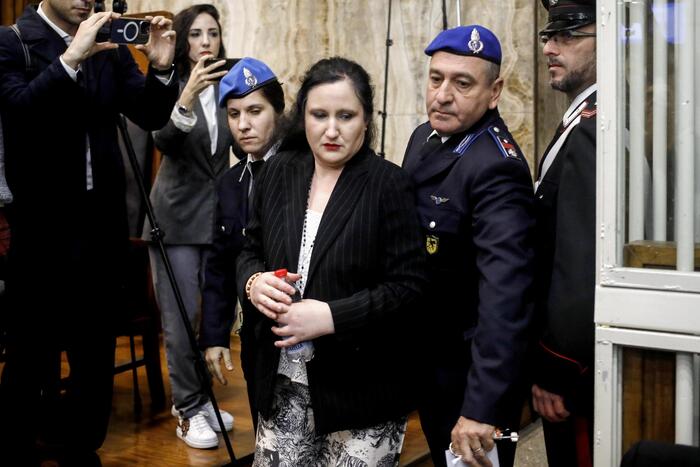Enlarge image
Commissioner Rubin (Meret Becker, l.) With witness (Bella Dayne): women's choice
Photo: Hans Joachim Pfeiffer / rbb
Last looks, last kisses, last dances: This is Meret Becker's final »crime scene« as Nina Rubin, and it comes across as a farewell ceremony that has been pushed to the limit.
That's only fair;
For 15 episodes, Beckers Rubin combined hard research with hard drinking on the verge of a nervous breakdown.
Pure investigative excess.
As a Kreuzberg night-growth, Rubin knew how to combine the job with her personal addictions and longings: coke nose here, bar stool kissing there, later fetish sex not excluded, and right in the middle of it, interviewing witnesses.
Sometimes the inspector only worked overtime on the slopes because the heating at home was broken.
Nina Rubin was the Späti variant among the TV officials from the start.
Therefore, of course, the long »crime scene« farewell mostly takes place at night.
The best part is the last dance thing: Rubin meets a witness (Bella Dayne) at a lesbian ball in a Kreuzberg dance café (which is actually the Café Keese in Charlottenburg, where such balls were actually regularly held).
The scene is bathed in a promising glowing red.
The woman wants to testify against her husband, who heads a Russian mafia family, and demands to be included in a leniency program.
In order not to attract attention among the lesbian women, Rubin moves with the witness onto the dance floor between the other couples;
»Let it be love« by Rosenstolz is on.
The woman as a trophy
Officer and witness come very close, their bodies nestle against each other.
Suddenly Rubin whistles appreciatively and stares down at the apparently operated breasts of the others.
"Was it expensive?" asks the policewoman.
"All the women in the family do that, I didn't think about it," replies the mafia bride.
A strangely charged moment, because the Rosenstolz-Schmachtlied actually briefly flashes the possibility of love between the women, while at the same time the trophy mania of the gangster machos is dryly negotiated.
Because the business and crimes of the Russian mafia, the Bratwa, form the plot cloak that is loosely laid over the ruby exit: At the beginning, the commissioner and her colleague Karow (Mark Waschke) pull a disfigured, headless torso out of the Spree, who, after some clever forensic tricks, is identified as the corpse of an undercover cop.
The investigations lead to the clan of Yasha Bolshakov (Oleg Tikhomirov), the husband of the woman who asked Rubin to be included in the witness protection.
In the following, it is less important to convict the mafia boss of murder than to get his wife out of his villa before he becomes certain of her betrayal.
At home in Bratwa neo-baroque
How does the Bratwa tick?
The screenplay for this »crime scene«, which is one quarter sightseeing and three quarters an escape thriller, was written by the always well-informed Günter Schütter.
He had already researched and written the complex and hard-fought series »In the Face of Crime« from 2010 for Dominik Graf about Russian clans and their opponents in the police force.
While organized crime in the ten-part series still exuded a dubious brilliance, the Bratwa neo-baroque in »Tatort« (director: Ngo The Chau) is only a backdrop for brute force.
In a parallel montage, we see the mafia boss questioning his wife while he brutally penetrates her during intercourse.
Then the rape is counter-cut with a flashback to the undercover cop's outright slaughter;
the sex and the murder follow the same rhythm.
Sure, the filmmakers want to show us how deeply the violence of the Russian mafia is inscribed in all areas of life, that it doesn't stop at the bedroom.
But does it need such an aestheticized rape sequence?
As a mafia thriller, the thriller eventually gets stuck in the exquisitely photographed glossy violence.
And as a farewell greeting to the outgoing commissioner, he ends up doing a few loops too much with emotion.
In its melodramatic exaggeration, the Farewell episode is reminiscent of the one with which Mehmet Kurtulus as Cenk Batu said goodbye to the »crime scene« in 2012.
That was a consistently exaggerated pain opera.
But when the Rubin exits, the escape scenes, which are abstrusely abstruse in terms of tempo and obstacles, always lead to new final moments that are pregnant with meaning, which you believe less and less.
Last looks, last kisses, you know.
You are very exhausted when the well-deserved farewell tears flow for Meret Becker at the end.
Rating:
6 out of 10 points
"Crime scene: The girl who goes home alone",
Sunday, 8:15 p.m., Das Erste












/cloudfront-eu-central-1.images.arcpublishing.com/prisa/IGZ7GOCXZ5GUPAQ2HWGK6Z76BU.jpg)